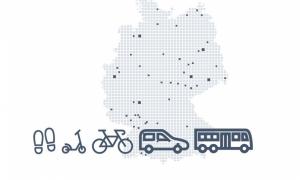
You are here
Closing conference
The “Mobility in Cities - SrV” research project regularly surveys the transport behavior of residents of German cities using an extensive household survey. In the 2023 SrV survey, over 280,000 people in around 500 municipalities were asked about their mobility behavior. One of the results highlighted by the researchers from the Chair of Mobility System Planning at TU Dresden is a trend towards more walking and cycling.
Mobility data is an indispensable component of municipal transport planning
The 12th survey round of the “System of Representative Travel Surveys (SrV)”, which has been in existence since 1972, took place from February 2023 to March 2024. Using a multi-method survey approach, the transport behavior of 281,998 people in 125,038 households with a total of 884,332 routes was surveyed. Due to the large sample size, it was also possible to gain differentiated insights into the development of mobility for various urban and population groups. With 97 commissioning institutions for the first time, the survey was carried out in around 500 cities and municipalities in 14 federal states. On this data basis, city-specific, city-comparative and cross-city conclusions can be drawn about people's mobility behavior.
The data generated is essential for future transport planning, says Prof. Regine Gerike, holder of the Chair of Mobility System Planning:
“Household surveys on everyday mobility are a particularly demanding form of mobility data collection and an indispensable part of municipal mobility planning. The high demand for this data is reflected in the 2023 survey by the large number of survey areas and the comprehensive sample, which allows comparative analyses. The quality of the 2023 travel survey was once again at a high level, meaning that we have a reliable continuation of the long-term study with this survey.”
Mobility trends: “Active mobility” and needs-based mobility behavior in the mobility mix
The “Mobility in cities” study determines the mobility characteristics of the urban resident population every five years. In SrV 2023, the focus of the survey was again on working days outside of school vacations and public holydays. The scientific analyses carried out at the professorship suggest, among other things, that a significant part of the observed trends can be attributed to the changed mobility behavior of working people.
The researchers note a clear change in people's urban mobility behavior compared to the last survey in 2018. This includes the fact that people are walking more often again - a trend that is being reinforced by people working from home, but is not only evident among those in employment. Cycling also continues to be very important for many people, and in many places the values were even higher than in 2018. Public transport has made an impressive recovery after the pandemic-related collapse. The positive experiences with the 9-euro ticket and the Deutschlandticket introduced in May 2023 played a significant role in this. Car use continues to decline, especially in (large) urban contexts. However, senior citizens are driving more outside of larger cities than in 2018. Finally, the range of available mobility options continues to increase. The trend towards more electric bicycles persists, with the Deutschlandticket already playing a significant role at the end of 2023.
The comprehensive results were presented to over 130 participants from science and practice at a final conference at TU Dresden.
The next SrV survey of the “Mobility in Cities” study will take place in 2028, the anniversary year of the Technische Universität Dresden.
Originalautor

Contact
Chair of Mobility System Planning
Project Lead "Mobility in Cities – SrV".
Dr.-Ing. Stefan Hubrich
E-Mail: stefan.hubrich@tu-dresden.de
